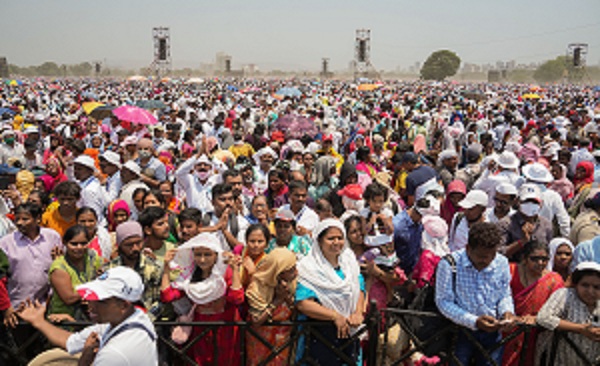Mumbai: Nine people were still undergoing treatment in different hospitals after suffering from sunstroke at a mega award function in Navi Mumbai, a civic official said on Tuesday.
Thirteen people had died after attending the event held in Kharghar area of Maharashtra’s Raigad district neighbouring Mumbai on Sunday.
The function was held in an open ground and was attended by several lakh people, most of them followers of social worker Appasaheb Dharmadhikari who was conferred with the Maharashtra Bhushan Award by Union Home Minister Amit Shah at the event.
The nearest weather station to the spot had recorded a maximum temperature of 38 degrees Celsius.
“The death toll stands at 13 as no fresh fatality has been reported. We discharged eight persons yesterday after treatment. Besides, five persons are recuperating at the MGM Hospital (Kamothe), three in a Vashi civic hospital and another patient at Medicover Hospital in Kharghar,” Panvel Municipal Corporation’s deputy commissioner Vitthal Dake said.
Chief Minister Eknath Shinde had termed the deaths as “very unfortunate” and said the kin of the deceased will be given a compensation of Rs 5 lakh.
Leader of Opposition in the Assembly Ajit Pawar had sought an inquiry into how the award event was organised during noon time when the temperature was very high.
Maharashtra Congress chief Nana Patole had said a case of culpable homicide must be registered against the Shinde government for the sunstroke deaths.
Nationalist Congress Party’s Lok Sabha member Supriya Sule had demanded the formation of a panel to probe the incident.
Many followers of Shree Parivar (Dharmadhikari’s organisation) had reached the venue on Friday and stayed there till the function concluded at around 1.30 pm on Sunday.
At the sprawling venue, some people complained of dizziness and other health complications. Some also fainted at the ground. They were initially treated at make shift medical facilities and later rushed to hospitals.
Dharmadhikari has a massive following in the state due to his tree plantation drives, blood donation and medical camps as well as de-addiction work in tribal areas.






